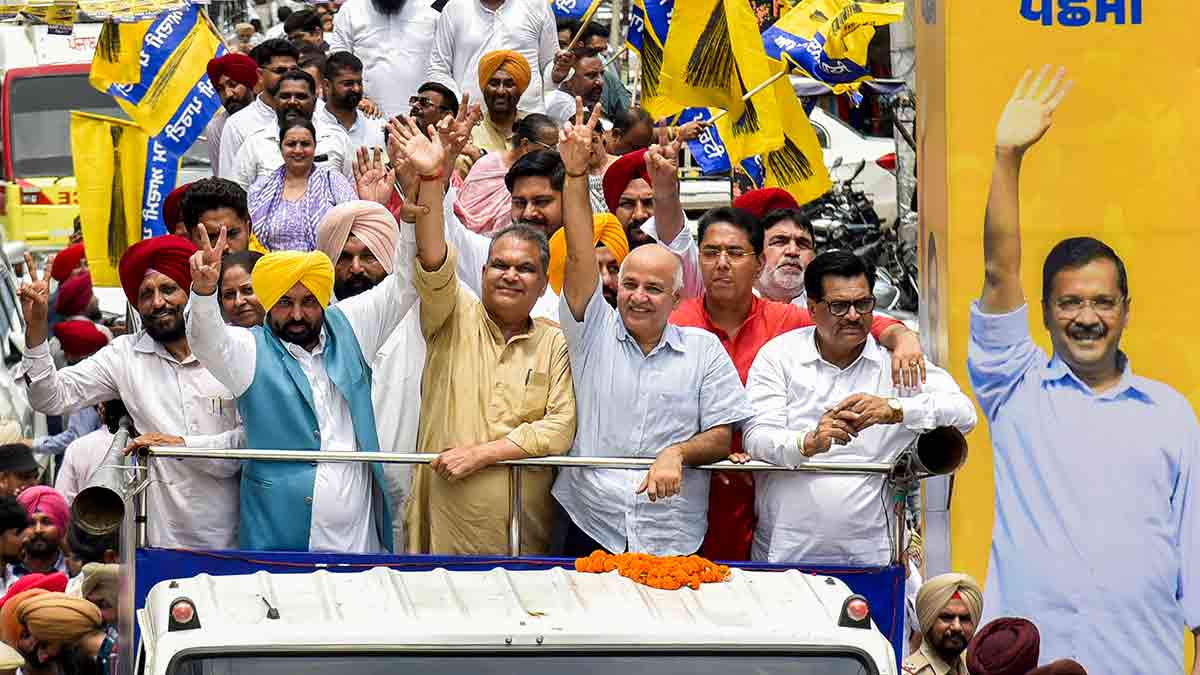Punjab becomes first state to launch ₹10 lakh health cover for 65 lakh families
 Comeback trail: Punjab Chief Minister Bhagwant Mann (yellow turban) with Manish Sisodia and Ludhiana West winner Sanjeev Arora (middle) on June 24 | PTI
Comeback trail: Punjab Chief Minister Bhagwant Mann (yellow turban) with Manish Sisodia and Ludhiana West winner Sanjeev Arora (middle) on June 24 | PTI
Punjab has become the first state to launch Rs 10 lakh health cover for its 65 lakh families. The scheme was jointly launched by Chief Minister Bhagwant Mann and AAP convenor and former Delhi CM Arvind Kejriwal. Nothing unusual in it, but it has been happening with increased frequency as the party chief has been unveiling programmes and projects along with the CM, the border state’s own version of ‘double-engine’ governance – replication of Delhi model in Punjab.
Kejriwal has placed the border state at the centre of his political strategy, both in terms of governance and party consolidation. His growing involvement in the affairs of the Bhagwant Mann-led government has triggered murmurs within the state and even invited sharp criticism from the Opposition parties that Punjab was being ruled from Delhi.
Kejriwal, who recently resumed active political engagement following his release on interim bail, has been holding a series of meetings with Mann and senior officials in Punjab. The sources argue that Kejriwal reviews key projects and welfare schemes along with Mann so that development is visible on the ground. After loss in Delhi, the AAP is putting all its energy to retain its government in the state when next polls are held in 2027.
AAP had recently won the Ludhiana West assembly bypoll silencing critics that anti-incumbency was at play in the state. As its candidate Sanjeev Arora won the bypoll, he resigned his Rajya Sabha seat triggering speculation that Kejriwal can go to the upper house, a move he has repeatedly denied.
Despite the criticism, AAP insiders claim the Kejriwal-Mann duo operates in sync, and that the Delhi Chief Minister’s inputs are aimed at streamlining governance and delivery.
What is also working in AAP’s favour at the moment that the Opposition is still struggling to build their base. But the main opposition, Congress, BJP and Akali Dal also sense an opportunity.
On Monday, the Bharatiya Janata Party (BJP) appointed Ashwini Sharma as its new working president in Punjab — a move that party insiders say is aimed at strengthening organisational structure, particularly in the wake of a renewed push to expand its support base beyond urban pockets and into rural, Dalit-dominated constituencies.
Sharma, a former state unit chief and sitting MLA from Pathankot, is expected to play a key role in mobilising cadre and overseeing booth-level preparedness ahead of the 2027 Assembly elections, while coordinating with the central leadership on alliance decisions. His elevation also comes in wake of organisational elections being held in all the state units. Also, the incumbent, Sunil Jakhar, had expressed his desire to step down.
The BJP has been trying to project itself as a serious contender, but has seen that without an alliance partner it can go only as far.
The former BJP ally, the Shiromani Akali Dal (SAD), too, has begun reorganising its cadre network in a bid to regain lost political ground. The party announced a fresh list of district presidents — part of an internal revamp aimed at reconnecting with its traditional rural and panthic vote bank. The Akalis, who continue to face electoral headwinds post their 2020 break-up with the BJP and the fallout of the farm protests, are now trying to rebuild a decentralised and agile party structure. Akali Dal chief Sukhbir Singh Badal eyes a political revival.
Meanwhile, Kejriwal’s sharp focus on Punjab—often seen through the lens of his national ambitions—has undoubtedly unsettled the political field. He has claimed that the party will both Punjab and Gujarat elections in 2027. Whether it strengthens AAP’s grip on the state or fuels a more united opposition front remains to be seen.
India